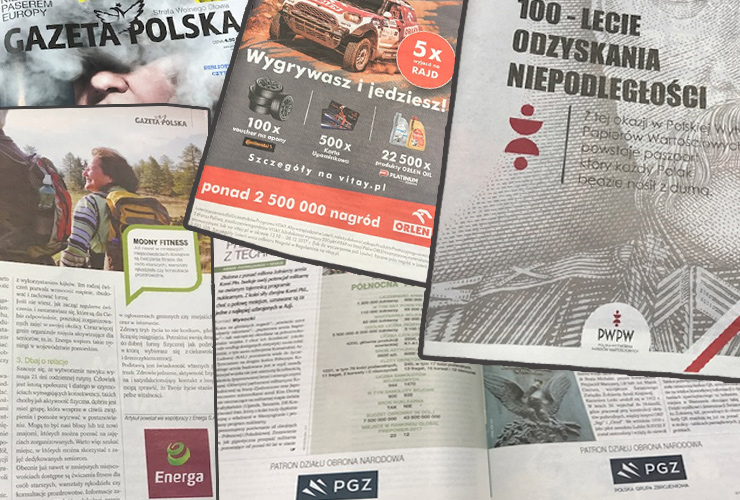Opening a recent issue of Gazeta Polska, a Polish right-wing weekly, readers find a page advertising a lottery programme funded by oil company PKN Orlen, in which the Polish state has the largest stake. A few pages later, there is a full-page advertisement for PWPW, a state-owned company that issues official documents such as passports and banknotes. Further in, there is a double-spread on defence sponsored by PGZ, a holding company uniting Poland’s state-owned defence companies. Another article received financial support from Energa, one of Poland’s four big state-owned energy companies.
These companies’ bright logos in Gazeta Polska reflect the shift in advertising by state-controlled companies in Poland’s highly polarised weekly news magazine market since the Law and Justice (PiS) party came to power in October 2015. Since then, these companies have directed financial support to right-wing media outlets broadly supportive of the PiS government. Meanwhile, outlets critical of the government have seen a corresponding drop in advertising revenue.
As a result, Gazeta Polska has thrived, despite falling sales. Its average circulation in 2016 was 35,000 copies, almost 5 percent fewer than the previous year. Yet at its publisher, Niezależne Wydawnictwo Polskie, revenue soared by 70 percent in 2016 and net profit by 692 percent, according to data in the National Court Register published by press.pl. Over that period, the publisher’s proportion of revenue from advertising more than doubled, to 58 percent, up from 26 percent the previous year.
Other weeklies broadly supportive of PiS’s policies and ideology have also seen an increase in overall advertising revenue since the party came to power. At W Sieci (since renamed Sieci Prawdy) and Do Rzeczy, advertising revenue during the first half of 2016 rose by 39 percent and 14 percent year-on-year, according to data collected by Kantar Media. The increase at Gazeta Polska was 287 percent, admittedly from a low base.
Meanwhile, the same data showed that advertising at Newsweek Polska and Polityka, two major weeklies critical of the government, slid by 8 percent and 15 percent overall, respectively.
Media executives say this drop reflects the sudden withdrawal of advertising by state-owned companies.
“State-owned companies are no longer placing their advertisements in our media,” Marc Walder, CEO of the Swiss company Ringier, told the Neue Zürcher Zeitung in June. As Ringier Axel Springer, the company owns Newsweek Polska, along with a range of other media outlets in Poland. “This will cost us millions of euros,” he added.
Similarly, advertising by state-owned companies at Polityka dropped after PiS won the elections. It now receives nothing from them, the weekly’s publishing director Piotr Zmelonek told the International Press Institute (IPI) in a recent interview.
In the past, funding for magazines – including education content sponsored by state bodies – was allocated based on objective criteria, such as a publication’s reach, he said. But since PiS came to power, these metrics have been superseded by political criteria, he suggested.
Yet the figures on advertising revenue collected by Kantar Media only tell part of the story, Zmelonek added.
“Money from state-owned companies is obtained differently now,” he said. “There has been a sudden birth of new initiatives [by right-wing publications] that provide other ways of obtaining funding from them.”
According to Zmelonek, these initiatives, which include conferences or awards sponsored by state-owned companies, offer a “pretext” for the companies to transfer additional funds to government-friendly media outlets, while not being counted by monitoring bodies.
At the same time, media outlets critical of the government have seen a decrease in subscriptions by ministries. Last year, Wirtualnemedia.pl reported a sharp decline in subscriptions to Polityka and Newsweek Polska, along with daily Gazeta Wyborcza, across a range of ministries after PiS came to power. At the foreign ministry, the number of subscriptions to Polityka fell from 33 to 12, and from 23 to 8 for Newsweek Polska. At the ministry of the environment, the drop was from 14 to 1 and from 4 to 1 respectively.
This shift echoes the hostility towards critical journalism displayed by some PiS politicians. This April, PiS lawmaker Andrzej Melak called for ministries to halt subscriptions to media outlets critical of the government, including Newsweek Polska and Polityka, along with Gazeta Wyborcza. “Those who harm Poland should not be fed,” he told money.pl, a financial news website.
Critics say these developments amount to the use of state resources to support pro-government media outlets, while muffling criticism.
Zmelonek is among those who see them as part of a “broader strategy to weaken critical media”. At Polityka, advertising by state-owned companies previously only accounted for a small proportion of advertising revenue, which itself accounts for roughly one-quarter of the magazine’s total revenue. Taken alone, the withdrawal of advertising by state-owned companies has not had a marked effect on how the magazine operates, Zmelonek said. But he noted that it compounds existing problems in the Polish print media market, which is already struggling with declining print advertising and falling sales.
“If all these streams of revenue dwindle, it becomes altogether more difficult to operate,” he said.



